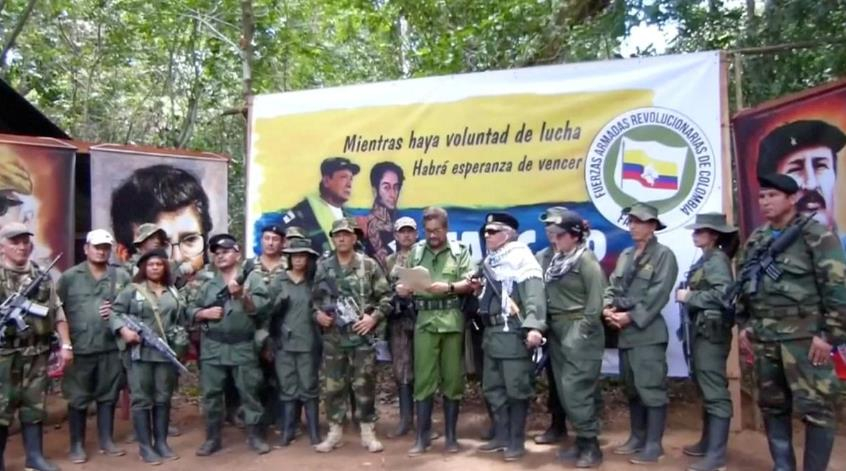

Former FARC commander known by his alias Ivan Marquez reads a statement that they will take the insurgency once again, in this undated screen grab obtained from a video released on August 29, 2019. /Reuters photo
When Colombian businessman Christian Ulloa heard that former members of the FARC rebels had rejected a peace deal with the government and launched a new offensive, he could not help but feel alarm.
Two decades ago, Ulloa’s father was held captive for seven months by the Revolutionary Armed Forces of Colombia (FARC), a rebel group that financed itself through kidnapping, extortion of businesses and drug trafficking.
A 2016 peace deal with the government was meant to end the FARC’s five decades of war but last week several former commanders announced they have rearmed because of what they said was the government’s failure to comply with the deal.
The offensive – which drew condemnation from other former fighters and the FARC’s new political party – could give pause to investors who have begun to look to Latin America’s fourth-largest economy as a stable destination for capital, according to industry groups and analysts.
The energy and agriculture sectors – which operate in rural places that often lack state presence – could in particular face security risks.
“It creates some uncertainty, some insecurity and some fear towards the future,” said Ulloa, who runs his family’s civil engineering consultancy, which advises oil, gas and infrastructure companies.
Some 13,000 ex-guerrillas are involved in a reintegration process, but it has been troubled by delays in payments to fund businesses for ex-fighters, plus the killing of dozens of ex-rebels and right-wing President Ivan Duque’s unsuccessful attempts to toughen the terms of the deal.
The former commander Luciano Marin, known by his nom de guerre Ivan Marquez, announced the return to arms in a video on Thursday and said his group would no longer use kidnappings as a financing tool, but would tax multinationals and illegal economic activity.
Marquez – one of the negotiators of the 2016 peace deal – did not specify what kind of illegal activity would be taxed. Before the peace deal the FARC regularly denied participating in drug trafficking, saying that it merely levied duties on traffickers.
The breakaway armed group will seek dialogue with business owners, ranchers, merchants and wealthy individuals to secure contributions to “the progress of communities,” Marquez added, without providing further details.
Some business leaders are confident the dissidents pose no major threat but said investors are watching cautiously nevertheless.
Juan Camilo Narino, the head of the Colombian Mining Association, said Duque’s government would be able to contain small groups of dissidents.
“If you look back a decade, one of the biggest worries for the private sector was insecurity because of these groups. It’s not like that now,” Narino said.
“But without a doubt these are incidents, messages, which investors will note and based on which they’ll make future decisions.”
Dissident FARC rebels who reject the deal are unlikely to affect security in large urban areas, strategic consulting firm Control Risks said, but the guerrillas will likely stage attacks against energy infrastructure in rural areas.

Copyright © 2018 CGTN. Beijing ICP prepared NO.16065310-3
Copyright © 2018 CGTN. Beijing ICP prepared NO.16065310-3